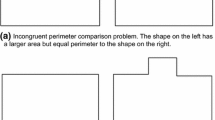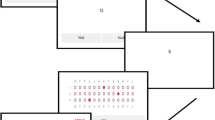Abstract
The comparability of data generated by think aloud and thought listing was investigated. High math-anxious students completed two sets of mathematics problems. During one set they thought aloud while problem solving and during the other they listed their cognitions after completing each problem. Assessment method order and problem set order were counterbalanced in a split-plot design. The dependent variables included 11 cognitive content variables, subjective anxiety, number of problems correct, and amount of time for each problem set-assessment phase. Students were significantly more anxious and took longer to list thoughts than to think aloud. Differences on number of problems correct approached significance. On the average, think aloud produced about twice as many thoughts as thought listing and significantly more thoughts in four categories: review of information, strategic calculations, conclusions, and attention control. Thought listing produced significantly more positive problem-solving evaluations and more positive self-evaluations. An analysis on proportions revealed the same differences plus a significantly greater proportion of thoughts in five other categories for thought listing. The implications for cognitive assessment were discussed.
Similar content being viewed by others
References
Arnkoff, D. B., & Smith, R. S. (1982, August). Comparison of two cognitive assessment procedures in an actual test situation. In M. A. Bruch (Chair),Advances in test anxiety research: Cognitive processes that enhance performance. Symposium presented at the annual convention of the American Psychological Association, Washington.
Bandura, A. (1977). Self-efficacy: Toward a unifying theory of behavioral change.Psychological Review, 84 191–215.
Bower, G. (1978). Contacts of cognitive psychology with social learning theory.Cognitive Therapy and Research, 2 123–146.
Cacioppo, J. T., & Petty, R. E. (1981). Social psychological procedures for cognitive response assessment: The thought-listing technique. In T. V. Merluzzi, C. R. Glass, & M. Genest (Eds.),Cognitive assessment. New York: Guilford Press.
College Entrance Examination Board and Educational Testing Service. (1980). Scholastic Aptitude Test (Forms 7G027, 8G071, OB023). Princeton, New Jersey.
Ericsson, K. A., & Simon, H. A. (1980). Verbal reports as data.Psychological Review, 87 215–252.
Ericsson, K. A., & Simon, H. A. (1981). Sources of evidence on cognition: A historical overview. In T. B. Merluzzi, C. R. Glass, & M. Genest (Eds.),Cognitive assessment. New York: Guilford Press.
Fulkerson, K. F. (1982).Cognitions of male and female high and low math anxious college students. Unpublished doctoral dissertation, University of North Carolina at Chapel Hill.
Galassi, J. P., Frierson, H. T., Jr., & Sharer, R. (1981). Concurrent versus retrospective assessment in test anxiety research.Journal of Consulting and Clinical Psychology, 49 614–615.
Genest, M., & Turk, D. C. (1981). Think-aloud approaches to cognitive assessment. In T. V. Merluzzi, C. R. Glass, & M. Genest (Eds.),Cognitive assessment. New York: Guilford Press.
Glass, C. R. (1980, September). Advances and issues in cognitive assessment. In J. P. Galassi (Chair),Current issues and research in cognitive assessment and cognitive-behavioral counseling. Symposium presented at the annual convention of the American Psychological Association, Montreal.
Glass, C. R., & Arnkoff, D. F. (1982). Think cognitively: Selected issues in cognitive assessment and therapy. In P. C. Kendall (Ed.),Advances in cognitive-behavioral research and therapy (Vol. 1). New York: Academic Press.
Glass, C. R., Gottman, J. M., & Shmurak, S. H. (1976). Response-acquisition and cognitive self-statement modification approaches to dating-skills training.Journal of Counseling Psychology, 23 520–526.
Hurlburt, R. t. (1979). Random sampling of cognitions and behavior.Journal of Research in Personality, 13 103–111.
Hurlburt, R. T., & Sipprelle, C. N. (1978). Random sampling cognitions in alleviating anxiety attacks.Cognitive Therapy and Research, 2 165–169.
Kendall, P. C. (1983). Methodology and cognitive-behavioral assessment.Behavioural Psychotherapy, 11 285–301.
Kendall, P. C., & Hollon, S. D. (1981). Assessing self-referent speech: Methods in the measurement of self-statements. In P. C. Kendall & S. D. Hollon (Eds.),Assessment strategies for cognitive-behavioral interventions. New York: Academic Press.
Kendall, P. C., & Korgeski, G. P. (1979). Assessment and cognitive-behavioral interventions.Cognitive Therapy and Research, 3 1–21.
Klinger, E. (1978). Modes of normal conscious flow. In K. S. Pope & J. L. Singer (Eds.),The stream of consciousness: Scientific investigations into the flow of human experience. New York: Plenum Press.
Malkiewich, L. E., & Merluzzi, T. V. (1980). Rational restructuring vs desensitization with clients of diverse conceptual level: A test of a client treatment matching model.Journal of Counseling Psychology, 27 453–461.
Meichenbaum, D. H., & Butler, L. (1979). Cognitive ethology: Assessing the streams of cognition and emotion. In K. Blankstein, P. Pliner, & J. Polivy (eds.),Advances in the study of communication and affect: Assessment and modification of emotional behavior (Vol. 6). New York: Plenum Press.
Merluzzi, T. V., Rudy, T. E., & Glass, C. R. (1981). The information-processing paradigm: Implications for clinical science. In T. V. Merluzzi, C. R. Glass, & M. Genest (Eds.),Cognitive assessment. New York: Guilford Press.
Newell, A., & Simon, H. A. (1972).Human problem solving. Englewood Cliffs, New Jersey: Prentice-Hall.
Orner, M. T. (1962). On the social psychology of the psychological experiment: With particular reference to demand characteristics and their implications.American Psychologist, 17 776–783.
Richardson, F. C., & Suinn, R. M. (1972). The Mathematics Anxiety Rating Scale: Psychometric data.Journal of Counseling Psychology, 19 551–554.
Richardson, F. C., & Woolfolk, R. T. (1978). Mathematics anxiety. In I. G. Sarason (Ed.),Test anxiety: Theory, research, and application. Hillsdale, New Jersey: Erlbaum.
Suinn, R. M. (1972).Mathematics Anxiety Rating Scale. Fort Collins, Colorado: RMBSI.
Wicklund, R. A., & Brehm, J. W. (1976).Perspectives on cognitive dissonance. Hillsdale, New Jersey: Erlbaum.
Wolpe, J., & Lazarus, A. A. (1966).Behavior therapy techniques: A guide to the treatment of neuroses. New York: Pergamon Press.
Author information
Authors and Affiliations
Additional information
This study was based on a doctoral dissertation by the first author under the supervision of the second author. The authors would like to thank Helen Bricker, Bill Tornquist, and William Ware for assistance with this study. Appreciation is also expressed to the College Entrance Examination Board and Educational Testing Service for permission to use Scholastic Aptitude Test questions.
Rights and permissions
About this article
Cite this article
Blackwell, R.T., Galassi, J.P., Galassi, M.D. et al. Are cognitive assessment methods equal? A comparison of think aloud and thought listing. Cogn Ther Res 9, 399–413 (1985). https://doi.org/10.1007/BF01173089
Issue Date:
DOI: https://doi.org/10.1007/BF01173089




